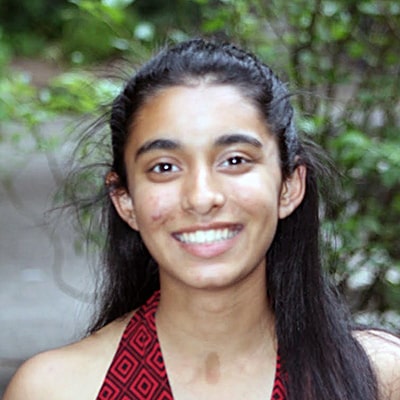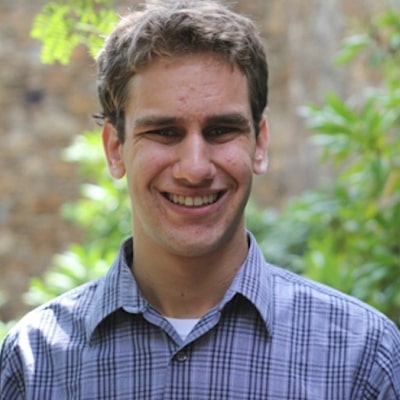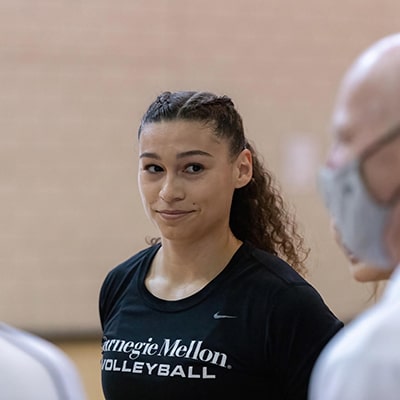Class of 2023 Reflects, Looks Toward the Future
By Yoori Kim
When students earn a degree from Carnegie Mellon University’s Dietrich College of Humanities and Social Sciences, they emerge with unique skills that employers seek along with the ability to acquire new ones, setting them up for long-term career growth.
Ashni Mathuria (DC 2023), Michael Granovetter (DC 2022) and Arianna Rosario (DC 2023) are just a few Dietrich College graduates who share reflections on the value of their CMU experience and their next steps.
Pursuing Non-fiction in Academia
 After graduating this past spring from the Department of English with a degree in creative writing and an additional major in technical writing, Mathuria plans to pursue a master’s degree in creative writing at Columbia University, focusing her work on non-fiction.
After graduating this past spring from the Department of English with a degree in creative writing and an additional major in technical writing, Mathuria plans to pursue a master’s degree in creative writing at Columbia University, focusing her work on non-fiction.
The English Department helped her to develop a combination of critical creative thinking and knowledge of rhetoric expertise, which has shaped her into a more polished and thoughtful writer. Her work as a communication support consultant with the Student Academic Success Center for three years also played a large role in her growth.
“Classes such as ‘Style’ were really impactful to me,” Mathuria said. “Not just for practicality, but so that I could really learn what writing is and approach it as a form of information management.”
Outside the classroom, Mathuria was busy dancing with CMU Bhangra, competing with women’s club volleyball and editing for The Oakland Review, Carnegie Mellon’s premier literary-arts journal.
Mathuria’s schedule could sometimes turn into an elaborate balancing act, but she explained how it taught her the importance of staying grounded and seeking support when she needed it.
“My greatest advice for CMU students is to take care of yourself and offer yourself compassion,” Mathuria said.
Training for a Future in Medicine
 Granovetter earned his Ph.D. from the Department of Psychology in 2022 and is continuing his education through the Medical Scientist Training Program, a highly selective program in which candidates complete their first two years of medical school at the University of Pittsburgh, attend CMU to earn a Ph.D. and return to Pitt for their last two years of medical school.
Granovetter earned his Ph.D. from the Department of Psychology in 2022 and is continuing his education through the Medical Scientist Training Program, a highly selective program in which candidates complete their first two years of medical school at the University of Pittsburgh, attend CMU to earn a Ph.D. and return to Pitt for their last two years of medical school.
Granovetter’s research at CMU largely focused on how pediatric brain surgeries, specifically ones involving the removal of the right or left hemisphere, could impact child development and cognitive ability.
“This research moves us one step further toward enabling us to give more concrete guidance to patients and their parents about the effects on cognitive abilities after brain surgery,” Granovetter said. “There’s still more work to be done.”
During his time at Dietrich College, Granovetter had the opportunity to be a teaching assistant for the Biological Foundations of Behavior course and a mentor for undergraduates within the Department of Psychology. He also shared information on medical school and doctorate programs with undergraduate students and helped to host a free, educational webinar in coordination with the American Physician Scientists Association.
“Nobody’s graduate school experience will look exactly the same,” Granovetter said. “It’s important to remember that if you come in with a vision of what you want to get out of graduate school, then you’ll have the flexibility to tailor your graduate school experiences for what comes next.”
Engaging and Educating the Public
 This past spring, Rosario, a recent graduate of the Department of Social and Decision Sciences with a double major in decision science and policy and management, had an internship with the Pittsburgh Zoo & Aquarium. She has since transitioned to a full-time position with the organization.
This past spring, Rosario, a recent graduate of the Department of Social and Decision Sciences with a double major in decision science and policy and management, had an internship with the Pittsburgh Zoo & Aquarium. She has since transitioned to a full-time position with the organization.
Although she didn’t take biological science courses, the empirical research and data collection skills Rosario learned through Dietrich College’s curriculum helped her obtain her current position.
“As a keeper, I am constantly speaking with the public, which is a mixed group of both adults and children,” Rosario said. “In any course I took at CMU where I had to present in front of the class, I learned how to constantly consider my audience and pace myself while talking.”
Rosario was also a teaching assistant for the courses Negotiation and Causal Inference in the Field. Outside of the classroom, Rosario was the captain of CMU’s women’s varsity volleyball team where she says she’s made unbreakable bonds with her teammates.
“Your grades are important, but the relationships you make with people, your professors and peers, really matter,” she said. “You also have to get your head out of the books sometimes and just enjoy yourself.”